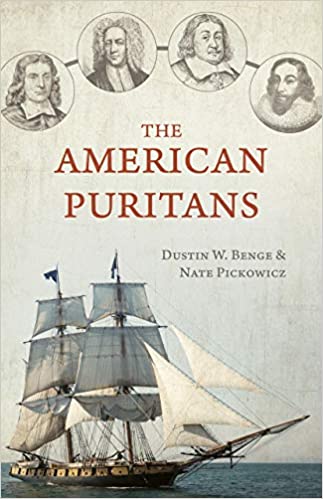A Book Review from Books At a Glance
by Chad Chauvin
Dustin Benge and Nate Pickowicz have produced this biographical collection of Puritan ministers, public officials, and writers who fled Archbishop William Laud of the Church of England and the British Monarchy to create an experimental “city on a hill” in the early New England era. The preface includes an extensive timeline of people and events, including the reign of sixteenth-century and seventeenth-century English kings and queens, the immigration of English Puritans to the New World, ecclesiastical milestones such as the establishment of the Westminster Assembly of Divines, critical legislative measures such as the Act of Uniformity, and birth and death dates of key American Puritans. What follows the preface is a chronological biography of nine American Puritans who were impacted by these events, including: William Bradford, John Winthrop, John Cotton, Thomas Hooker, Thomas Sheard, Anne Bradstreet, John Eliot, Samuel Willard, and Cotton Mather. The individual accounts overlap, as many of these New England Puritans were well acquainted with one another. The first seven Puritans were first-generation American Pilgrims, while Willard and Mather were children of immigrants.
These American Puritans were all cut from the same religious cloth. They were either Separatists or Non-conformists who fled their Motherland in pursuit of religious freedom. Both groups were unwilling to succumb to what they believed to be unscriptural practices within the Church of England. They wanted to have the freedom to select their own ministers and to worship God according to their own conscience. Separatists wanted to break away from the Church of England and form independent churches, while non-conformists tried to change the Church of England from the inside. Both were increasingly being persecuted, including being denied the right of assembly, imprisonment of their ministers, and sometimes martyrdom. To avoid this persecution, the Puritan families were willing to risk health, wealth and even their own lives to immigrate to America. Plague and sickness were common foes. Benge and Pickowicz record multiple accounts of Puritan spouses and children dying at early ages. Some of the pastors remarried multiple times. In Mather’s case, he married three times and outlived twelve of his fourteen children.
The first-generation of American Puritans had a vision of establishing a “city on a hill” in the Plymouth and Massachusetts colonies. This phrase was often used by the Puritans to describe “an exemplary community of godly people.” Many early seeds of American independence from England were sown by these Pilgrims, who sought to establish principles of religious and civil liberty. Evangelism of the Native Americans was a priority. They stressed the importance of church community and sought to establish a unified government that centered around biblical justice and equity. The first two Puritans, Bradford and Winthrop were governors of the two colonies who sought to establish a government centered on biblical truth. However, it did not take long for the Puritans to realize that a utopian Christian community was not possible on this side of eternity. The influence of greed and carnality by immigrant merchants, conflicts with Native Americans, and the loss of zeal for holiness and God’s glory by second-generation immigrants contributed to the waning vision in the later part of the seventeenth-century.
Readers will be interested in several recorded events and circumstances which occurred during the American colonial period. For example, the Antinomian Controversy (1636-1638) was sparked by Ann Hutchinson. She taught that it was legalistic to believe that salvation must be accompanied by good works. Several Puritan ministers were involved in resolving the controversy. Also, Bradstreet was known for her elegant poetry which captured the Puritan sentiment of her time. Eliot, known as “the Apostle to the Indians,” translated all sixty-six books of the Bible into the Massachusett language. The Salem witch trial included accusations against several prominent Puritan preachers and political leaders. Finally, education—in particular theological education—was of utmost importance to the Puritans, which led to the creation of Harvard College.
The history and insights offered by The American Puritans provide a welcome awareness of many of the struggles and challenges faced by early American settlers. Benge and Pickowicz have written in a rich and clear style that makes this book easy for the novel historian to read. The individual biographies are full of personal accounts about the trials and triumphs experienced by the early New England Puritans. Notably absent is a history of the Baptist and Quaker Pilgrims; this primer is limited to Calvinistic believers who were proponents of pedobaptist covenant theology. Pastors and teachers will find this book to be a valuable resource for teaching and sermon illustrations. Christian readers of all types will be encouraged to read the various accounts of the Pilgrims who helped to shape America’s views on religious liberty.
Chad Chauvin (PhD, Midwestern Baptist Theological Seminary) is a volunteer teacher at Riverside Baptist Church in Watson, Louisiana.
